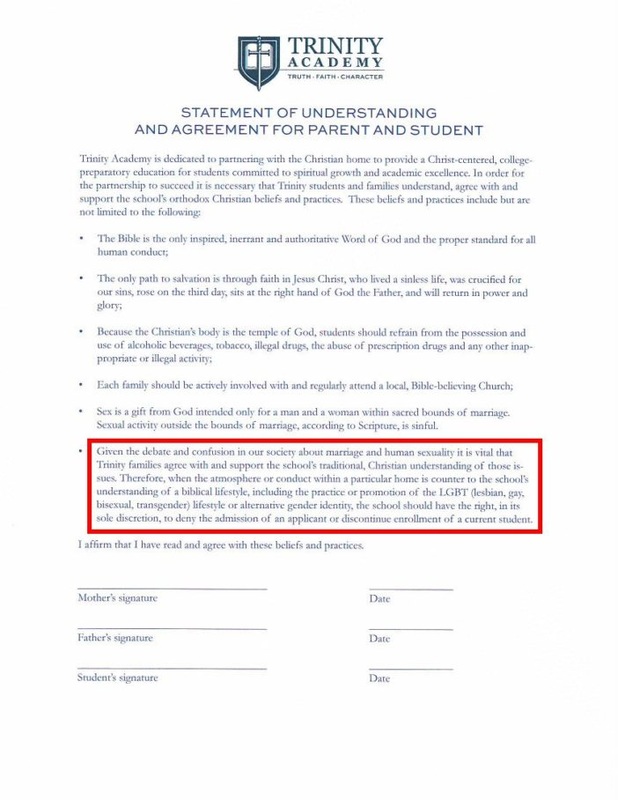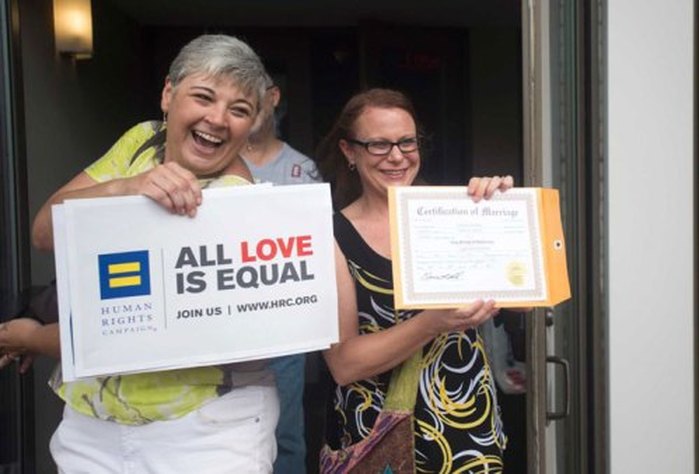Cracker Barrel Bans Event by Pastor Who Urged Execution of Gays
Cracker Barrel restaurants were once infamous for a homophobic employment policy, but now the company has declined to let a minister who urged the execution of LGBTQ people to hold an event at one of its locations.
Grayson Fritts, pastor of All Scripture Baptist Church in Knoxville, Tenn., had planned to hold an event for his congregation at the Cracker Barrel in Cleveland, Tenn., June 29, CNN reports. Fritts has become notorious for a sermon he gave June 2 saying, “God has instilled the power of civil government to send the police in 2019 out to these LGBT freaks and arrest them. Have a trial for them, and if they are convicted, then they are to be put to death.”
Fritts is also a detective with the Knox County Sheriff’s Office, but is on sick leave and planning to take early retirement in July. The sheriff’s office is reviewing his record, and the county prosecutor is investigating him as well.
Mary Mancini, chair of the Tennessee Democratic Party, contacted Cracker Barrel’s corporate headquarters in Lebanon, Tenn., when she heard about the event, CNN reports. She noted Fritts’s hateful sermon and the fact that he is under investigation, and she pointed out that the company has a “diversity and inclusion” policy.
Cracker Barrel responded by saying it will not allow Fritts or his group on site and that company officials “disagree strongly with their statements of hate and divisiveness.” The statement, posted to Twitter, added, “At Cracker Barrel, we work hard to foster a culture that is welcoming and inclusive — we have a zero-tolerance policy for discriminatory treatment or harassment of any sort.”
Cracker Barrel has changed significantly in the past few decades. In 1991 it adopted a policy calling for the termination of employees “whose sexual preferences fail to demonstrate normal heterosexual values which have been the foundation of families in our society.” That led to boycotts and protests around the nation. It later revoked the policy, saying it was a “well-intentioned overreaction to the perceived values of our customers,” and in 2002 it added sexual orientation to the characteristics covered by the company’s nondiscrimination policy. Now, as part of its diversity and inclusion program, it offers several employee resource groups, including one for LGBTQ workers.
Grayson Fritts, pastor of All Scripture Baptist Church in Knoxville, Tenn., had planned to hold an event for his congregation at the Cracker Barrel in Cleveland, Tenn., June 29, CNN reports. Fritts has become notorious for a sermon he gave June 2 saying, “God has instilled the power of civil government to send the police in 2019 out to these LGBT freaks and arrest them. Have a trial for them, and if they are convicted, then they are to be put to death.”
Fritts is also a detective with the Knox County Sheriff’s Office, but is on sick leave and planning to take early retirement in July. The sheriff’s office is reviewing his record, and the county prosecutor is investigating him as well.
Mary Mancini, chair of the Tennessee Democratic Party, contacted Cracker Barrel’s corporate headquarters in Lebanon, Tenn., when she heard about the event, CNN reports. She noted Fritts’s hateful sermon and the fact that he is under investigation, and she pointed out that the company has a “diversity and inclusion” policy.
Cracker Barrel responded by saying it will not allow Fritts or his group on site and that company officials “disagree strongly with their statements of hate and divisiveness.” The statement, posted to Twitter, added, “At Cracker Barrel, we work hard to foster a culture that is welcoming and inclusive — we have a zero-tolerance policy for discriminatory treatment or harassment of any sort.”
Cracker Barrel has changed significantly in the past few decades. In 1991 it adopted a policy calling for the termination of employees “whose sexual preferences fail to demonstrate normal heterosexual values which have been the foundation of families in our society.” That led to boycotts and protests around the nation. It later revoked the policy, saying it was a “well-intentioned overreaction to the perceived values of our customers,” and in 2002 it added sexual orientation to the characteristics covered by the company’s nondiscrimination policy. Now, as part of its diversity and inclusion program, it offers several employee resource groups, including one for LGBTQ workers.
Christian school will expel students with queer relatives
Even if you’re the most Christ-affirming, bible-thumping, cross-wearing zealot in your family, if your sister is lesbian, your dad comes out as trans, your mom decides she’s bi or your brother brings home a boyfriend, Trinity Academy in Wichita, Kansas is not the school for you. And administrators of the Christian high school are making sure everybody knows that.
As Patheos reported, the school is requiring prospective and current attendees and their parents to sign an agreement that they will provide a home in line with Trinity’s “orthodox Christian beliefs and practices.”
Not surprisingly, students and their parents are required to accept that the Bible is the “authoritative Word of God and the proper standard for all human conduct,” and to promise to abstain from alcohol, smoking, and sex before marriage. All that’s pretty standard for a school where the ideal student hails from a Christian home and is looking for a “Christ-centered, college-preparatory education.”
“Given the debate and confusion in our society about marriage and human sexuality it is vital that Trinity families agree with and support the school’s traditional, Christian understanding of those issues. Therefore, when the atmosphere or conduct within a particular home is counter to the school’s understanding of a biblical lifestyle, including the practice or promotion of the LGBT (lesbian, gay, bisexual, transgender) lifestyle or alternative gender identity, the school should have the right, in its sole discretion, to deny the admission of an applicant or discontinue enrollment of a current student.”
So, a student can be as straight as an arrow and still be threatened with expulsion or rejected as an applicant if Trinity’s Christian soldiers find out your family is harboring a lesbian, gay, bisexual, transgender or queer relative.
As Patheos noted, this applies even if they’re celibate, which is an exception to the rule at many fundamentalist schools.
As Patheos reported, the school is requiring prospective and current attendees and their parents to sign an agreement that they will provide a home in line with Trinity’s “orthodox Christian beliefs and practices.”
Not surprisingly, students and their parents are required to accept that the Bible is the “authoritative Word of God and the proper standard for all human conduct,” and to promise to abstain from alcohol, smoking, and sex before marriage. All that’s pretty standard for a school where the ideal student hails from a Christian home and is looking for a “Christ-centered, college-preparatory education.”
“Given the debate and confusion in our society about marriage and human sexuality it is vital that Trinity families agree with and support the school’s traditional, Christian understanding of those issues. Therefore, when the atmosphere or conduct within a particular home is counter to the school’s understanding of a biblical lifestyle, including the practice or promotion of the LGBT (lesbian, gay, bisexual, transgender) lifestyle or alternative gender identity, the school should have the right, in its sole discretion, to deny the admission of an applicant or discontinue enrollment of a current student.”
So, a student can be as straight as an arrow and still be threatened with expulsion or rejected as an applicant if Trinity’s Christian soldiers find out your family is harboring a lesbian, gay, bisexual, transgender or queer relative.
As Patheos noted, this applies even if they’re celibate, which is an exception to the rule at many fundamentalist schools.
That anti-gay bill in Arkansas actually became law. Why couldn’t activists stop it?
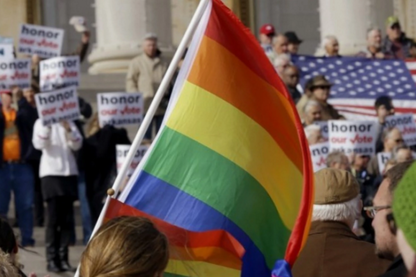
Monday was the deadline for Arkansas Gov. Asa Hutchinson to veto SB 202, the anti-anti-discrimination bill that seeks to prevent cities and counties from protecting the civil rights of gay people.
The bill passed the legislature 10 days ago. Hutchinson said he would allow it to become law. During the past week, pressure had been mounting on the governor to change his mind.
Five days ago, the Arkansas chapter of the Human Rights Campaign released a statement condemning the bill. “Discrimination is not an Arkansas value, and the Governor should take swift, immediate action to veto SB202,” said chapter director Kendra R. Johnson.
On Saturday, national groups like the American Civil Liberties Union, Lambda Legal, and the National Center for Lesbian Rights joined in asking Hutchinson to veto it.
“There is nothing but discriminatory intent here,” the groups’ press release reads. “And no valid public interest can possibly be served by allowing private businesses to discriminate based on sexual orientation, gender identity or other characteristics that might be covered by local ordinances.”
Finally on Sunday night, musician and gay icon Cher weighed in on the bill, accusing the governor of “hanging the LBGT community out to dry”:
The bill passed the legislature 10 days ago. Hutchinson said he would allow it to become law. During the past week, pressure had been mounting on the governor to change his mind.
Five days ago, the Arkansas chapter of the Human Rights Campaign released a statement condemning the bill. “Discrimination is not an Arkansas value, and the Governor should take swift, immediate action to veto SB202,” said chapter director Kendra R. Johnson.
On Saturday, national groups like the American Civil Liberties Union, Lambda Legal, and the National Center for Lesbian Rights joined in asking Hutchinson to veto it.
“There is nothing but discriminatory intent here,” the groups’ press release reads. “And no valid public interest can possibly be served by allowing private businesses to discriminate based on sexual orientation, gender identity or other characteristics that might be covered by local ordinances.”
Finally on Sunday night, musician and gay icon Cher weighed in on the bill, accusing the governor of “hanging the LBGT community out to dry”:
Caitlyn Jenner calls Hillary Clinton a 'political hack' and a 'f--king liar'
Conservative reality show star also insists Donald Trump would be 'very good for women's issues'
Caitlyn Jenner went into a tirade over Democratic presidential front-runner Hillary Clinton on the latest episode of her reality series I Am Cait.
Stating the obvious Jenner says at one point to the camera: ‘Just because I’m a woman now doesn’t make me all of a sudden liberal.’
Chatting with a group of other transgender women who regularly appear on the show with her – all clearly liberal – Jenner said: ‘I would never, ever, ever vote for Hillary… If Hillary becomes president, the country is over.’
Actress Candis Cayne was part of the group and annoys Jenner when she describes the former First Lady, US Senator and Secretary of State as ‘an amazing woman.’
In response Jenner yells: ‘What has she done in her life?! What has she done?’
Jenner then goes on to assess Clinton’s performance in her high-profile political positions. ‘She was a lousy senator. She was horrible. Look at all of the things that are going on in the Middle East, all because of what she did. Look at Benghazi. She lied to us! She’s a f***ing liar!’
As the other women tried to protest, Jenner continued to rant and said: ‘You want a person that’s going to lie to you?… She’s a political hack. That’s all she is. She’s done nothing!’
Jenner then cleared the room when she began to defend Republican presidential front-runner Donald Trump who has been known to make disparaging and deeply insulting comments about such women as Fox News anchor Megyn Kelly and actress Rosie O’Donnell.
“I think he’d be very good for women’s issues. I don’t think he’s out there to destroy women or do any of that kinda stuff.’
Stating the obvious Jenner says at one point to the camera: ‘Just because I’m a woman now doesn’t make me all of a sudden liberal.’
Chatting with a group of other transgender women who regularly appear on the show with her – all clearly liberal – Jenner said: ‘I would never, ever, ever vote for Hillary… If Hillary becomes president, the country is over.’
Actress Candis Cayne was part of the group and annoys Jenner when she describes the former First Lady, US Senator and Secretary of State as ‘an amazing woman.’
In response Jenner yells: ‘What has she done in her life?! What has she done?’
Jenner then goes on to assess Clinton’s performance in her high-profile political positions. ‘She was a lousy senator. She was horrible. Look at all of the things that are going on in the Middle East, all because of what she did. Look at Benghazi. She lied to us! She’s a f***ing liar!’
As the other women tried to protest, Jenner continued to rant and said: ‘You want a person that’s going to lie to you?… She’s a political hack. That’s all she is. She’s done nothing!’
Jenner then cleared the room when she began to defend Republican presidential front-runner Donald Trump who has been known to make disparaging and deeply insulting comments about such women as Fox News anchor Megyn Kelly and actress Rosie O’Donnell.
“I think he’d be very good for women’s issues. I don’t think he’s out there to destroy women or do any of that kinda stuff.’
Mets To Hold LGBT-Themed Pride Night For First Time Ever
NEW YORK (CBSNewYork) — For the first time, the Mets will host an LGBT-themed Pride Night at Citi Field this baseball season.
The team will hold a news conference on Tuesday to announce the plans for Pride Night. LGBT Network chief executive officer David Kilmnick talked with WCBS 880 about the plan.
“We’re real excited about it, because sports and athletics is one of the last bastions of homophobia that we have to tackle, and a lot of people – about lot of LGBT people – do not feel safe either going to games or on the ballfield if they’re in school or in college,” Kilmnick said.
Kilmnick said the Mets are sponsoring the Pride Night for all to feel welcome at Citi Field, and part of the proceeds from ticket sales will go to support anti-bullying efforts in Long Island and New York City schools.
He said Pride Night was the brainchild of the LGBT network, but the Mets were fully onboard.
“We approached the Mets back in October, as they were getting ready to go on their journey to the World Series, and the Mets were incredibly responsive, and the Mets have always been seen as an underdog in the New York sports landscape, so it makes sense for the Mets to stick up for every single New Yorker,” Kilmnick said.
He said the Mets are the first New York team to hold a Pride Night.
The team will hold a news conference on Tuesday to announce the plans for Pride Night. LGBT Network chief executive officer David Kilmnick talked with WCBS 880 about the plan.
“We’re real excited about it, because sports and athletics is one of the last bastions of homophobia that we have to tackle, and a lot of people – about lot of LGBT people – do not feel safe either going to games or on the ballfield if they’re in school or in college,” Kilmnick said.
Kilmnick said the Mets are sponsoring the Pride Night for all to feel welcome at Citi Field, and part of the proceeds from ticket sales will go to support anti-bullying efforts in Long Island and New York City schools.
He said Pride Night was the brainchild of the LGBT network, but the Mets were fully onboard.
“We approached the Mets back in October, as they were getting ready to go on their journey to the World Series, and the Mets were incredibly responsive, and the Mets have always been seen as an underdog in the New York sports landscape, so it makes sense for the Mets to stick up for every single New Yorker,” Kilmnick said.
He said the Mets are the first New York team to hold a Pride Night.
First Republican U.S. Senator Co-Sponsors LGBT Equality Act
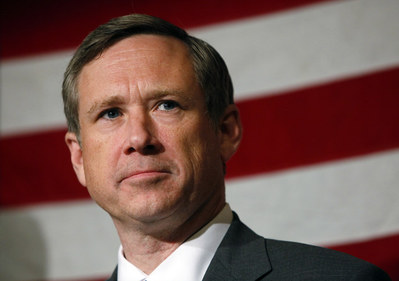
Mark Kirk of Illinois became the first U.S. Republican senator to co-sponsor the Equality Act on Tuesday, turning the LGBT anti-discrimination bill into a bipartisan effort in both chambers of Congress.
“Discrimination on the basis of being gay is against the law in Illinois and should be against the law nationwide,” Kirk told Buzz Feed News.
Kirk has been outspoken among Republicans for marriage equality and LGBT protections, but he did not elaborate on why he signed on to the bill six months after it was introduced. Still, Kirk’s comment gives insight to tensions faced by lawmakers who represent states that ban LGBT discrimination but belong to a political party that has historically opposed LGBT-rights laws.
The Equality Act would bar discrimination against people on the basis of their sexual orientation or gender identity by expanding a band of civil rights laws — which already protect individuals on the basis of race, religion, and national origin.
If passed by a future Congress, it would be the most comprehensive federal policy to protect LGBT rights in housing, workplaces, schools, public accommodations, financial institutions, and other settings.
The measure is unlikely to pass in the current Republican-dominated Congress, but Sen. Jeff Merkley, lead sponsor of the Senate bill, lauded support from across the aisle.
“In communities across America, Republicans and Democrats alike share a common belief that discriminating against someone just because of who they are is fundamentally wrong,” he told BuzzFeed News. “It is time for all Americans to work together to end long-standing discrimination against the LGBT community.”
Democrats also got a boost in the House last week when Rep. Robert Dold, also from Illinois, announced he would co-sponsor the House version of the Equality Act. Dold was the bill’s the first Republican co-sponsor in Congress.
The House version is sponsored by Rhode Island Rep. David Cicilline.
“Discrimination on the basis of being gay is against the law in Illinois and should be against the law nationwide,” Kirk told Buzz Feed News.
Kirk has been outspoken among Republicans for marriage equality and LGBT protections, but he did not elaborate on why he signed on to the bill six months after it was introduced. Still, Kirk’s comment gives insight to tensions faced by lawmakers who represent states that ban LGBT discrimination but belong to a political party that has historically opposed LGBT-rights laws.
The Equality Act would bar discrimination against people on the basis of their sexual orientation or gender identity by expanding a band of civil rights laws — which already protect individuals on the basis of race, religion, and national origin.
If passed by a future Congress, it would be the most comprehensive federal policy to protect LGBT rights in housing, workplaces, schools, public accommodations, financial institutions, and other settings.
The measure is unlikely to pass in the current Republican-dominated Congress, but Sen. Jeff Merkley, lead sponsor of the Senate bill, lauded support from across the aisle.
“In communities across America, Republicans and Democrats alike share a common belief that discriminating against someone just because of who they are is fundamentally wrong,” he told BuzzFeed News. “It is time for all Americans to work together to end long-standing discrimination against the LGBT community.”
Democrats also got a boost in the House last week when Rep. Robert Dold, also from Illinois, announced he would co-sponsor the House version of the Equality Act. Dold was the bill’s the first Republican co-sponsor in Congress.
The House version is sponsored by Rhode Island Rep. David Cicilline.
Gay marriage order puts spotlight again on the 'Ayatollah of Alabama'
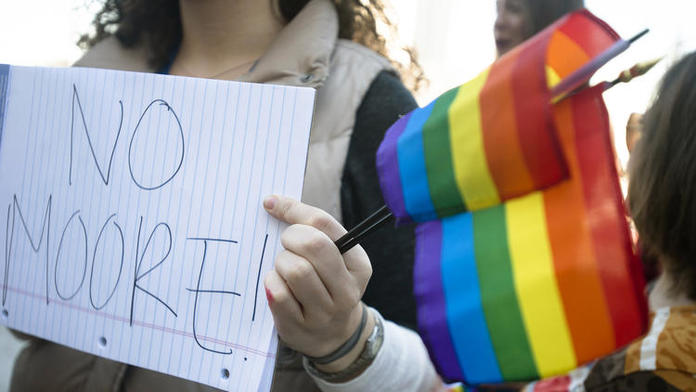 A rally against Alabama Chief Justice Roy Moore on Tuesday outside the Alabama Supreme Court building in Montgomery. (Albert Cesare / Montgomery Advertiser)
A rally against Alabama Chief Justice Roy Moore on Tuesday outside the Alabama Supreme Court building in Montgomery. (Albert Cesare / Montgomery Advertiser)
When Alabama Chief Justice Roy Moore issued his latest controversial order on gay marriage, urging probate judges to stop issuing marriage licenses to same-sex couples, many considered it a brazen, last-ditch act of defiance against the U.S. Supreme Court.
The long-contentious chief justice of the Alabama Supreme Court didn’t see it that way at all. Merely a humdrum matter of procedure, he explained. “At this point, I am not defying the United States Supreme Court,” the staunch 68-year-old Baptist and Republican said.
When it comes to Moore -- dubbed the “Ayatollah of Alabama” by a civil rights group and chided by the daughter of the late George Wallace as being more dangerous than the combative former governor -- little is ever just humdrum procedure.
Alabama Chief Justice Roy Moore.
Few have put their stamp as firmly on modern-day Alabama in such polarizing fashion as Moore. Two decades ago, he became known as the “Ten Commandments” judge after he put up a wooden plaque quoting the biblical commandments in his Etowah County courtroom.
When he was elected the state’s chief justice in 2000, Moore installed a 2 1/2-ton granite monument to the Ten Commandments in the rotunda of Alabama’s judicial building.
“In order to establish justice,” he told a crowd at its unveiling, “we must invoke 'the favor and guidance of Almighty God.'"
Three years later he was removed from office when he defied a federal order to remove the monument. But then in 2012, he made a comeback, again winning election as Alabama’s chief justice.
For years, the Ten Commandments monument stood inside the Alabama Judicial Building in Montgomery.
Now he’s elbowed his way back into the news with his legal reasoning that the Supreme Court’s landmark ruling in July on same-sex marriage only has standing in four states – Michigan, Kentucky, Ohio and Tennessee.
It did not, he argued, automatically strike down the Alabama Supreme Court’s previous order that judges not issue marriage licenses to gay and lesbian couples.
“It couldn’t serve as precedent because we ruled first,” Moore said of the Supreme Court ruling, Obergefell vs. Hodges.
Many legal analysts dismiss his latest bid to block gay marriage as nonsense.
“The Supreme Court decision has authoritative precedent that binds all state officials,” said Ronald Krotoszynski, a law professor at the University of Alabama. “This is little different than a Southern governor ordering school officials to refuse to segregate schools.”
Peggy Wallace Kennedy said Moore had actually strayed further afield than her father, who famously stood in front of the University of Alabama in 1963 to defy national efforts to desegregate.
In 1963, Alabama Gov. George Wallace, wearing suit at left, tried to block the admission of two black students at the University of Alabama.
“George Wallace was able, by virtue of his office, to take political advantage by publicly promoting a theology of discrimination, but Roy Moore cannot,” Peggy Wallace Kennedy wrote about her father in an opinion piece for Al.com. “George Wallace was not confined by a code of ethics that restricted his right to rabble rouse, but Roy Moore is.”
A former boxer and professional kick boxer who once worked as a cattle rancher in the Australian outback, Moore is an eccentric chief justice, even by Southern standards. Born in a poor, rural corner of northeast Alabama -- his father a jackhammer operator, his mother a homemaker -- the values of religion were instilled early on.
After years of prayer, he was admitted to West Point, where he found his Southern accent and lack of education made him a target of intimidation. He took to the boxing ring to level the playing field.
As a military commander in Vietnam, he was dubbed “Captain America” for his attempts to instill discipline and stop illegal drug use among his soldiers. Eventually, he became so unpopular he installed sandbags under his bed and in the walls of his quarters to protect him from underlings who might try to kill him in his sleep.
Long-standing legal and political observers say Moore is no political opportunist, but a true believer who thinks he is doing God’s work. “To quote the Blues Brothers, he’s on a mission from God,” Krotoszynski said.
“He is a religious zealot,” said Richard Cohen, president of the Southern Poverty Law Center, which has filed an ethics complaint against Moore for his efforts to enforce Alabama’s same-sex marriage ban. “He believes he is a law unto himself, and he has an independent oath to interpret the Constitution.”
A protest against Alabama Chief Justice Roy Moore on Tuesday outside the Alabama Supreme Court building in Montgomery.
(Albert Cesare / Montgomery Advertiser)In an interview with the Los Angeles Times, Moore declined to express his opinions on gay marriage, saying he would restrict his comments to his administrative order.
He was not always been so reticent.
In 2002, he delivered a widely criticized opinion in a child custody battle between a father of three children and his former wife, a lesbian. Homosexuality, Moore wrote, was "abhorrent, immoral, detestable, a crime against nature and a violation of the laws of nature and of nature's God." The state, he suggested, "carries the power of the sword, that is, the power to prohibit conduct with physical penalties, such as confinement and even execution” against gay couples.
In 2012, when campaigning for chief justice, Moore told an Alabama tea party rally that same-sex marriage would be “the ultimate destruction of our country because it destroys the very foundation upon which this nation is based.”
Federal attorneys in Alabama have repeatedly rejected Moore’s legal stance on gay marriage. Last July, a federal district judge in Mobile ordered Alabama judges to issue same-sex marriage licenses in accordance with the U.S. Supreme Court’s historic ruling.
“This issue has been decided by the highest court in the land and Alabama must follow that law,” U.S. attorneys Joyce White Vance of the Northern District of Alabama and Kenyen Brown of the Southern District of Alabama reiterated in a statement last week.
Moore scoffs at such criticism. “The United States Supreme Court does not make the law of the land,” he said. “The law of the land is the United States Constitution. They rule on cases from various circuits and their decisions are final in those circuits, but they’re not an automatic law.”
While he is accused of sowing confusion across Alabama, Moore maintains he is simply trying to clarify the law until the state’s Supreme Court, which has been deliberating for six months on the effect of Obergefell on its prior ruling, makes a decision.
Significantly, Moore’s latest order seems to have had little impact on the availability of marriage licenses throughout the state. According to the Montgomery Advertiser, only three probate courts reported stopping issuing marriage licenses last week. Most of the state’s 67 counties are issuing licenses to all couples.
To quote the Blues Brothers, he's on a mission from God.- Ronald Krotoszynski, University of Alabama law professorWhile Alabama remains one of the nation’s most conservative states, there has been a gradual shift of public opinion on moral issues, including same-sex marriage and prayer in schools, said Gerald Johnson, a retired political science professor at Auburn University.
Nearly a decade ago, 81% of voters in Alabama passed a constitutional amendment prohibiting same-sex marriage. A 2014 American Values Atlas survey found that 59% of Alabamans opposed allowing gay and lesbian couples to marry legally.
“Generally, voters are drifting away from where Moore stands,” Johnson said.
Some political observers say Moore, who cannot be reelected as chief justice in 2018, might use his stance on gay marriage to position himself as governor.
Yet even if Moore’s position on gay marriage might serve him in a Republican Party primary, it could be a liability in a general election, Johnson said, noting that Moore had already lost gubernatorial campaigns in 2006 and 2010. “His views are not held widely or supported by the majority of Alabamians.”
Moore takes it all in stride. “I’ve been involved in many battles over the federal Constitution,” he said last week. “This is probably not the last.”
The long-contentious chief justice of the Alabama Supreme Court didn’t see it that way at all. Merely a humdrum matter of procedure, he explained. “At this point, I am not defying the United States Supreme Court,” the staunch 68-year-old Baptist and Republican said.
When it comes to Moore -- dubbed the “Ayatollah of Alabama” by a civil rights group and chided by the daughter of the late George Wallace as being more dangerous than the combative former governor -- little is ever just humdrum procedure.
Alabama Chief Justice Roy Moore.
Few have put their stamp as firmly on modern-day Alabama in such polarizing fashion as Moore. Two decades ago, he became known as the “Ten Commandments” judge after he put up a wooden plaque quoting the biblical commandments in his Etowah County courtroom.
When he was elected the state’s chief justice in 2000, Moore installed a 2 1/2-ton granite monument to the Ten Commandments in the rotunda of Alabama’s judicial building.
“In order to establish justice,” he told a crowd at its unveiling, “we must invoke 'the favor and guidance of Almighty God.'"
Three years later he was removed from office when he defied a federal order to remove the monument. But then in 2012, he made a comeback, again winning election as Alabama’s chief justice.
For years, the Ten Commandments monument stood inside the Alabama Judicial Building in Montgomery.
Now he’s elbowed his way back into the news with his legal reasoning that the Supreme Court’s landmark ruling in July on same-sex marriage only has standing in four states – Michigan, Kentucky, Ohio and Tennessee.
It did not, he argued, automatically strike down the Alabama Supreme Court’s previous order that judges not issue marriage licenses to gay and lesbian couples.
“It couldn’t serve as precedent because we ruled first,” Moore said of the Supreme Court ruling, Obergefell vs. Hodges.
Many legal analysts dismiss his latest bid to block gay marriage as nonsense.
“The Supreme Court decision has authoritative precedent that binds all state officials,” said Ronald Krotoszynski, a law professor at the University of Alabama. “This is little different than a Southern governor ordering school officials to refuse to segregate schools.”
Peggy Wallace Kennedy said Moore had actually strayed further afield than her father, who famously stood in front of the University of Alabama in 1963 to defy national efforts to desegregate.
In 1963, Alabama Gov. George Wallace, wearing suit at left, tried to block the admission of two black students at the University of Alabama.
“George Wallace was able, by virtue of his office, to take political advantage by publicly promoting a theology of discrimination, but Roy Moore cannot,” Peggy Wallace Kennedy wrote about her father in an opinion piece for Al.com. “George Wallace was not confined by a code of ethics that restricted his right to rabble rouse, but Roy Moore is.”
A former boxer and professional kick boxer who once worked as a cattle rancher in the Australian outback, Moore is an eccentric chief justice, even by Southern standards. Born in a poor, rural corner of northeast Alabama -- his father a jackhammer operator, his mother a homemaker -- the values of religion were instilled early on.
After years of prayer, he was admitted to West Point, where he found his Southern accent and lack of education made him a target of intimidation. He took to the boxing ring to level the playing field.
As a military commander in Vietnam, he was dubbed “Captain America” for his attempts to instill discipline and stop illegal drug use among his soldiers. Eventually, he became so unpopular he installed sandbags under his bed and in the walls of his quarters to protect him from underlings who might try to kill him in his sleep.
Long-standing legal and political observers say Moore is no political opportunist, but a true believer who thinks he is doing God’s work. “To quote the Blues Brothers, he’s on a mission from God,” Krotoszynski said.
“He is a religious zealot,” said Richard Cohen, president of the Southern Poverty Law Center, which has filed an ethics complaint against Moore for his efforts to enforce Alabama’s same-sex marriage ban. “He believes he is a law unto himself, and he has an independent oath to interpret the Constitution.”
A protest against Alabama Chief Justice Roy Moore on Tuesday outside the Alabama Supreme Court building in Montgomery.
(Albert Cesare / Montgomery Advertiser)In an interview with the Los Angeles Times, Moore declined to express his opinions on gay marriage, saying he would restrict his comments to his administrative order.
He was not always been so reticent.
In 2002, he delivered a widely criticized opinion in a child custody battle between a father of three children and his former wife, a lesbian. Homosexuality, Moore wrote, was "abhorrent, immoral, detestable, a crime against nature and a violation of the laws of nature and of nature's God." The state, he suggested, "carries the power of the sword, that is, the power to prohibit conduct with physical penalties, such as confinement and even execution” against gay couples.
In 2012, when campaigning for chief justice, Moore told an Alabama tea party rally that same-sex marriage would be “the ultimate destruction of our country because it destroys the very foundation upon which this nation is based.”
Federal attorneys in Alabama have repeatedly rejected Moore’s legal stance on gay marriage. Last July, a federal district judge in Mobile ordered Alabama judges to issue same-sex marriage licenses in accordance with the U.S. Supreme Court’s historic ruling.
“This issue has been decided by the highest court in the land and Alabama must follow that law,” U.S. attorneys Joyce White Vance of the Northern District of Alabama and Kenyen Brown of the Southern District of Alabama reiterated in a statement last week.
Moore scoffs at such criticism. “The United States Supreme Court does not make the law of the land,” he said. “The law of the land is the United States Constitution. They rule on cases from various circuits and their decisions are final in those circuits, but they’re not an automatic law.”
While he is accused of sowing confusion across Alabama, Moore maintains he is simply trying to clarify the law until the state’s Supreme Court, which has been deliberating for six months on the effect of Obergefell on its prior ruling, makes a decision.
Significantly, Moore’s latest order seems to have had little impact on the availability of marriage licenses throughout the state. According to the Montgomery Advertiser, only three probate courts reported stopping issuing marriage licenses last week. Most of the state’s 67 counties are issuing licenses to all couples.
To quote the Blues Brothers, he's on a mission from God.- Ronald Krotoszynski, University of Alabama law professorWhile Alabama remains one of the nation’s most conservative states, there has been a gradual shift of public opinion on moral issues, including same-sex marriage and prayer in schools, said Gerald Johnson, a retired political science professor at Auburn University.
Nearly a decade ago, 81% of voters in Alabama passed a constitutional amendment prohibiting same-sex marriage. A 2014 American Values Atlas survey found that 59% of Alabamans opposed allowing gay and lesbian couples to marry legally.
“Generally, voters are drifting away from where Moore stands,” Johnson said.
Some political observers say Moore, who cannot be reelected as chief justice in 2018, might use his stance on gay marriage to position himself as governor.
Yet even if Moore’s position on gay marriage might serve him in a Republican Party primary, it could be a liability in a general election, Johnson said, noting that Moore had already lost gubernatorial campaigns in 2006 and 2010. “His views are not held widely or supported by the majority of Alabamians.”
Moore takes it all in stride. “I’ve been involved in many battles over the federal Constitution,” he said last week. “This is probably not the last.”
Alabama Chief Justice Orders Halt to Gay Marriage
by PETE WILLIAMS
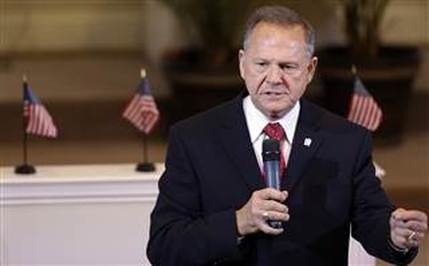 Alabama Supreme Court Chief Justice Roy Moore speaks to the congregation of Kimberly Church of God on June 28, 2015, in Kimberley, Ala. Butch Dill / AP file
Alabama Supreme Court Chief Justice Roy Moore speaks to the congregation of Kimberly Church of God on June 28, 2015, in Kimberley, Ala. Butch Dill / AP file
The chief justice of Alabama's supreme court ordered state officials Wednesday to stop issuing marriage licenses to same-sex couples.
But legal experts say the effect of his order is likely to be minimal and short-lived.
Roy Moore, acting in his capacity as the administrative head of the state court system, said he was acting because "confusion and uncertainty" exists among the Alabama officials, known as probate judges, who issue marriage licenses in the state.
Moore said they don't know whether to abide by a ruling from the Alabama Supreme Court last March, which upheld the state's ban on same-sex marriage, or the U.S. Supreme Court's ruling in June declaring such bans unconstitutional.
Only the Alabama Supreme Court can resolve that issue, Moore said.
The confusion persists, he said, because the June ruling applied immediately only to the four states whose bans were directly challenged — Michigan, Ohio, Kentucky, and Tennessee.
But Moore's order ignores what's been happening in the federal courts. A federal judge in Alabama issued a ruling in May, declaring the state's ban on same-sex marriage invalid and forbidding probate judges to deny marriage licenses to gay couples.
And in October, the Eleventh Circuit Court of Appeals said that the U.S. Supreme Court's ruling on gay marriage nullified the earlier decision of Alabama's Supreme Court.
"I'd be very surprised if any of the probate judges now refuse to issue licenses to same-sex couples," said Randall Marshall of the ACLU of Alabama.
Any probate judges who did so would risk being found in contempt of court for disobeying the federal judge's order, he said.
That assessment also came from a group that has vowed to take legal action against any probate judge who refuses to issue the licenses agreed.
"I have a news flash for Roy Moore: the U.S. Supreme Court upheld marriage equality in June and the decision extends nationwide," said The Rev. Barry Lynn, of Americans United. "All Alabama probate judges remain bound by a federal court order to issue marriage licenses to same-sex couples
But legal experts say the effect of his order is likely to be minimal and short-lived.
Roy Moore, acting in his capacity as the administrative head of the state court system, said he was acting because "confusion and uncertainty" exists among the Alabama officials, known as probate judges, who issue marriage licenses in the state.
Moore said they don't know whether to abide by a ruling from the Alabama Supreme Court last March, which upheld the state's ban on same-sex marriage, or the U.S. Supreme Court's ruling in June declaring such bans unconstitutional.
Only the Alabama Supreme Court can resolve that issue, Moore said.
The confusion persists, he said, because the June ruling applied immediately only to the four states whose bans were directly challenged — Michigan, Ohio, Kentucky, and Tennessee.
But Moore's order ignores what's been happening in the federal courts. A federal judge in Alabama issued a ruling in May, declaring the state's ban on same-sex marriage invalid and forbidding probate judges to deny marriage licenses to gay couples.
And in October, the Eleventh Circuit Court of Appeals said that the U.S. Supreme Court's ruling on gay marriage nullified the earlier decision of Alabama's Supreme Court.
"I'd be very surprised if any of the probate judges now refuse to issue licenses to same-sex couples," said Randall Marshall of the ACLU of Alabama.
Any probate judges who did so would risk being found in contempt of court for disobeying the federal judge's order, he said.
That assessment also came from a group that has vowed to take legal action against any probate judge who refuses to issue the licenses agreed.
"I have a news flash for Roy Moore: the U.S. Supreme Court upheld marriage equality in June and the decision extends nationwide," said The Rev. Barry Lynn, of Americans United. "All Alabama probate judges remain bound by a federal court order to issue marriage licenses to same-sex couples
We are still under attack!
Ted Cruz Says Marriage Equality Ruling 'Will Not Stand'

Republican presidential hopeful Ted Cruz has once again denounced the Supreme Court’s marriage equality ruling, calling it “lawless” and “fundamentally illegitimate” during a campaign appearance with Christian right leader James Dobson in Iowa.
At the Monday event in Winterset, Dobson, founder of Focus on the Family, said the Supreme Court is “absolutely killing us, especially with regard to what they’ve just recently done to marriage,” and asked Cruz his view of the court and who he’d appoint. With a slightly dated nod to pop culture, Cruz responded, “Let me quote the movie Jerry Maguire: You had me at hello,” then went on to lambaste the June 26 marriage equality ruling as well as one the court made the day before, upholding federal subsidies for health insurance plans under the Affordable Care Act.
“We saw last summer, in a period of 24 hours, two lawless decisions back to back,” said the U.S. senator from Texas. “First the Supreme Court rewrote federal law, ignored the text of Obamacare, in order to rewrite that statute and force that failed policy, that failed law, on millions of Americans. And then 24 hours later, five unelected judges ignored the Constitution and purported to tear down the marriage laws of all 50 states. Those decisions were fundamentally illegitimate, they were lawless, and they will not stand.”
Earlier in the conversation, Cruz called on evangelical Christians to vote, claiming they failed to turn out strongly in the past two presidential elections, resulting in a government “advancing a secular agenda.”
“We have a federal government that is waging a war on life, a war on marriage, a war on religious liberty,” he said. “We have a federal government that is advancing a secular agenda that puts the ability of Bible-believing Christians to live our faith more and more in jeopardy and that is appeasing radical Islamic terrorism, in fact refuses even to acknowledge its name. And if you look at the federal government, you might say, ‘Why do we have government attacking life, attacking marriage, attacking faith, attacking religious liberty?’ Well, is it any wonder, when a majority of believers are staying home? If we allow nonbelievers to elect our leaders, we shouldn’t be surprised when our government doesn’t reflect our values.”
Iowa voters will state their preferences for the Republican and Democratic presidential nominees in caucuses to be held February 1.
Caffeinated Thoughts, an Iowa-based conservative blog, posted video of the Cruz-Dobson conversation. Watch below; the discussion of the evangelical vote comes at about the six-minute mark, the Supreme Court about 13 minutes in.
At the Monday event in Winterset, Dobson, founder of Focus on the Family, said the Supreme Court is “absolutely killing us, especially with regard to what they’ve just recently done to marriage,” and asked Cruz his view of the court and who he’d appoint. With a slightly dated nod to pop culture, Cruz responded, “Let me quote the movie Jerry Maguire: You had me at hello,” then went on to lambaste the June 26 marriage equality ruling as well as one the court made the day before, upholding federal subsidies for health insurance plans under the Affordable Care Act.
“We saw last summer, in a period of 24 hours, two lawless decisions back to back,” said the U.S. senator from Texas. “First the Supreme Court rewrote federal law, ignored the text of Obamacare, in order to rewrite that statute and force that failed policy, that failed law, on millions of Americans. And then 24 hours later, five unelected judges ignored the Constitution and purported to tear down the marriage laws of all 50 states. Those decisions were fundamentally illegitimate, they were lawless, and they will not stand.”
Earlier in the conversation, Cruz called on evangelical Christians to vote, claiming they failed to turn out strongly in the past two presidential elections, resulting in a government “advancing a secular agenda.”
“We have a federal government that is waging a war on life, a war on marriage, a war on religious liberty,” he said. “We have a federal government that is advancing a secular agenda that puts the ability of Bible-believing Christians to live our faith more and more in jeopardy and that is appeasing radical Islamic terrorism, in fact refuses even to acknowledge its name. And if you look at the federal government, you might say, ‘Why do we have government attacking life, attacking marriage, attacking faith, attacking religious liberty?’ Well, is it any wonder, when a majority of believers are staying home? If we allow nonbelievers to elect our leaders, we shouldn’t be surprised when our government doesn’t reflect our values.”
Iowa voters will state their preferences for the Republican and Democratic presidential nominees in caucuses to be held February 1.
Caffeinated Thoughts, an Iowa-based conservative blog, posted video of the Cruz-Dobson conversation. Watch below; the discussion of the evangelical vote comes at about the six-minute mark, the Supreme Court about 13 minutes in.
Big political lessons we learned in 2015
John Gallagher Intro by Randy Uehara Mistrot
Thursday, December 31, 2015
2015 will go down in LGBT history as a landmark year, primarily because of the final victory for marriage equality — but the changed political landscape is not confined to marriage.
Other events are shaping the community’s present and future in equally important ways, and not all of them are good. LGBT rights are under fire more than ever, many states still have discrimination in work and housing, our fight is far from over.
Here are three important political lessons we learned this year and the impact they will have in the coming year.
The courts are on our side
Everyone will long remember the Supreme Court decision granting marriage equality. But it’s easy to forget the equally important string of favorable decisions that led up to that ruling and the favorable decisions that followed.
Court after court struck down state bans on same-sex marriage, often in eloquent language defending our rights. Nor did it stop there.
As a sign of how serious the courts are, Kim Davis, America’s least beloved county clerk, was throw in jail for contempt of court for refusing to issue same-sex couples marriage licenses. Nor has it stopped there.
Just this month, the Supreme Court stopped an Alabama court from denying parental rights to a lesbian, signalling that the marriage case may lead to stronger protections for gay parents.
This isn’t to say that there aren’t struggles ahead. The debate about religious liberty is not likely to be a pretty one in the courtroom. But it’s clear that, by and large, the legal system now views protecting our rights as a fundamental principle, and that’s a major change for the better.
We don’t know how to capitalize on the momentum
We just achieved one of the greatest victories ever for the movement. But we seem content to rest on our laurels and not to push for the next victory. That’s led to a real fear that gay identity won’t mean as much as it used to.
marriage equality was a clear, understandable goal that affected a lot of couples. But there’s no agreement on what the next goal should be because nothing looms as large as marriage did.
That said, there are plenty of good causes to choose from. The obvious choice would be workplace protections, but given the grip of conservatives on state legislatures, that would be a long, uphill push, without the help of the courts. Perhaps it was inevitable that some of the energy would dissipate after the Supreme Court ruling, but it’s a bad sign that we’re in danger of losing most of it.
The GOP is completely unhinged
As hard as it is to believe that the Republican party could get any worse, the past year proved just that. It’s a little bit like the uncle you always thought was nutty and now you discover is completely psychotic.
After years of pandering to the nuttier elements of its base, the party establishment is discovering that only the most extreme views matter and that “moderate” candidates like Jeb Bush (who is far from moderate) are anathema to voters. Donald Trump has emerged as the perfect embodiment of the base’s id, and the equally nutty Ben Carson was briefly neck-and-neck with Trump in the polls.
All told, the Muslim-baiting, deportation-happy, D.C.-hating voting base is no longer the fringe but is driving the party agenda.
So can it get any worse? Two words: Ted Cruz. If he’s the nominee, the lesson for 2016 better be how to get out the vote.
Thursday, December 31, 2015
2015 will go down in LGBT history as a landmark year, primarily because of the final victory for marriage equality — but the changed political landscape is not confined to marriage.
Other events are shaping the community’s present and future in equally important ways, and not all of them are good. LGBT rights are under fire more than ever, many states still have discrimination in work and housing, our fight is far from over.
Here are three important political lessons we learned this year and the impact they will have in the coming year.
The courts are on our side
Everyone will long remember the Supreme Court decision granting marriage equality. But it’s easy to forget the equally important string of favorable decisions that led up to that ruling and the favorable decisions that followed.
Court after court struck down state bans on same-sex marriage, often in eloquent language defending our rights. Nor did it stop there.
As a sign of how serious the courts are, Kim Davis, America’s least beloved county clerk, was throw in jail for contempt of court for refusing to issue same-sex couples marriage licenses. Nor has it stopped there.
Just this month, the Supreme Court stopped an Alabama court from denying parental rights to a lesbian, signalling that the marriage case may lead to stronger protections for gay parents.
This isn’t to say that there aren’t struggles ahead. The debate about religious liberty is not likely to be a pretty one in the courtroom. But it’s clear that, by and large, the legal system now views protecting our rights as a fundamental principle, and that’s a major change for the better.
We don’t know how to capitalize on the momentum
We just achieved one of the greatest victories ever for the movement. But we seem content to rest on our laurels and not to push for the next victory. That’s led to a real fear that gay identity won’t mean as much as it used to.
marriage equality was a clear, understandable goal that affected a lot of couples. But there’s no agreement on what the next goal should be because nothing looms as large as marriage did.
That said, there are plenty of good causes to choose from. The obvious choice would be workplace protections, but given the grip of conservatives on state legislatures, that would be a long, uphill push, without the help of the courts. Perhaps it was inevitable that some of the energy would dissipate after the Supreme Court ruling, but it’s a bad sign that we’re in danger of losing most of it.
The GOP is completely unhinged
As hard as it is to believe that the Republican party could get any worse, the past year proved just that. It’s a little bit like the uncle you always thought was nutty and now you discover is completely psychotic.
After years of pandering to the nuttier elements of its base, the party establishment is discovering that only the most extreme views matter and that “moderate” candidates like Jeb Bush (who is far from moderate) are anathema to voters. Donald Trump has emerged as the perfect embodiment of the base’s id, and the equally nutty Ben Carson was briefly neck-and-neck with Trump in the polls.
All told, the Muslim-baiting, deportation-happy, D.C.-hating voting base is no longer the fringe but is driving the party agenda.
So can it get any worse? Two words: Ted Cruz. If he’s the nominee, the lesson for 2016 better be how to get out the vote.
Gambia’s parliament bans female genital mutilation
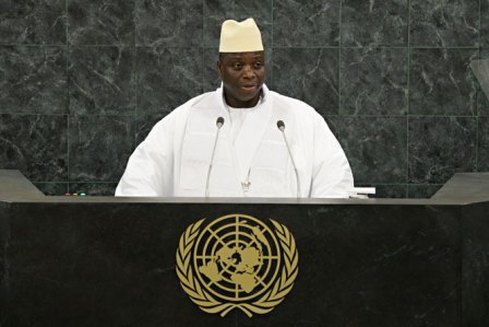
ABDOULIE JOHN | Associated Press
Thursday, December 31, 2015
DAKAR, Senegal — Gambia’s parliament has passed a bill banning female genital mutilation and setting strict penalties for offenders, a month after the president condemned the practice which is carried out on many women in the West African country.
A person who engages in female circumcision could face up to three years in prison or a fine of 50,000 dalasi ($1,250), the new law says. If the act results in death, a person could face life imprisonment, according to the bill which parliament passed on Monday.
President Yahya Jammeh condemned the practice in November, saying it was not mentioned in the Quran.
Female genital mutilation is practiced in more than half of African countries. It entails the complete or partial removal of the external genitalia of women and girls for nonmedical reasons.
It causes lifelong physical and emotional harm and can result in life-threatening complications during childbirth, the UK-based charity 28 Too Many has said. In 2010, female genital mutilation was carried out on nearly 80 percent of Gambian women and girls aged 15 to 49, the group said.
Gambia is the 27th sub-Saharan African country to now have legislation against female genital mutilation, said Dr. Isatou Touray of the Gambia Committee on Traditional Practices Affecting the Health of Women and Children.
Activists describe Jammeh’s stance as a welcome surprise.
Jammeh, in power since 1994, is often criticized for human rights abuses, including the torture of opponents and the persecution of gays and lesbians.
Thursday, December 31, 2015
DAKAR, Senegal — Gambia’s parliament has passed a bill banning female genital mutilation and setting strict penalties for offenders, a month after the president condemned the practice which is carried out on many women in the West African country.
A person who engages in female circumcision could face up to three years in prison or a fine of 50,000 dalasi ($1,250), the new law says. If the act results in death, a person could face life imprisonment, according to the bill which parliament passed on Monday.
President Yahya Jammeh condemned the practice in November, saying it was not mentioned in the Quran.
Female genital mutilation is practiced in more than half of African countries. It entails the complete or partial removal of the external genitalia of women and girls for nonmedical reasons.
It causes lifelong physical and emotional harm and can result in life-threatening complications during childbirth, the UK-based charity 28 Too Many has said. In 2010, female genital mutilation was carried out on nearly 80 percent of Gambian women and girls aged 15 to 49, the group said.
Gambia is the 27th sub-Saharan African country to now have legislation against female genital mutilation, said Dr. Isatou Touray of the Gambia Committee on Traditional Practices Affecting the Health of Women and Children.
Activists describe Jammeh’s stance as a welcome surprise.
Jammeh, in power since 1994, is often criticized for human rights abuses, including the torture of opponents and the persecution of gays and lesbians.
Kim Davis describes herself as someone who 'failed so miserably at marriage'
But three-time divorcee fought marriage equality for same-sex couples because it didn't fit 'God’s definition of marriage'
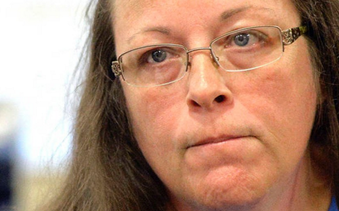
Rowan County Clerk Kim Davis became one of the most recognizable faces in the anti-gay marriage movement this year.
The three-time divorcee admits she is an unlikely leader in the fight.
‘How ironic that God would use a person like me, who failed so miserably at marriage in the world, to defend it now,’ Davis tells the Associated Press. ‘The Lord picks the unlikely source to convey the message.’
Citing religious beliefs, Davis refused to issue marriage licenses to same-sex couples following the US Supreme Court’s landmark ruling on 26 June that brought marriage equality to all 50 states.
She was later sent to a Kentucky jail for six days for defying an order by a federal judge that she not stand in the way of licenses being issued by her staff.
‘No one would ever have remembered a county clerk that just said … “Even though I don’t agree with it, it’s OK. I’ll do it,”‘ Davis says. ‘If I could be remembered for one thing, it’s that I was not afraid to not compromise myself.’
Davis will be up for re-election in two years and insists she’s not sure if she will run again. One thing she is sure of is that she is not about to seek higher office despite her wider name recognition.
‘If I were a politician, I would probably jump on that and grab it and growl. But I’m not a politician,’ she says. ‘I very much enjoy my job.’
The three-time divorcee admits she is an unlikely leader in the fight.
‘How ironic that God would use a person like me, who failed so miserably at marriage in the world, to defend it now,’ Davis tells the Associated Press. ‘The Lord picks the unlikely source to convey the message.’
Citing religious beliefs, Davis refused to issue marriage licenses to same-sex couples following the US Supreme Court’s landmark ruling on 26 June that brought marriage equality to all 50 states.
She was later sent to a Kentucky jail for six days for defying an order by a federal judge that she not stand in the way of licenses being issued by her staff.
‘No one would ever have remembered a county clerk that just said … “Even though I don’t agree with it, it’s OK. I’ll do it,”‘ Davis says. ‘If I could be remembered for one thing, it’s that I was not afraid to not compromise myself.’
Davis will be up for re-election in two years and insists she’s not sure if she will run again. One thing she is sure of is that she is not about to seek higher office despite her wider name recognition.
‘If I were a politician, I would probably jump on that and grab it and growl. But I’m not a politician,’ she says. ‘I very much enjoy my job.’
Copyright ©2000-2017 gaysuffrage.com
[email protected]
All Rights Reserved.
No part of this website can be copied, replicated, or used without written permission from gaysuffrage.com.
gaysuffrage.com is privately owned.


